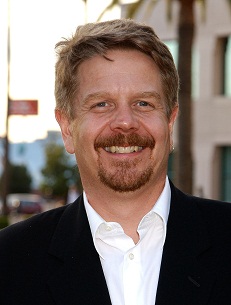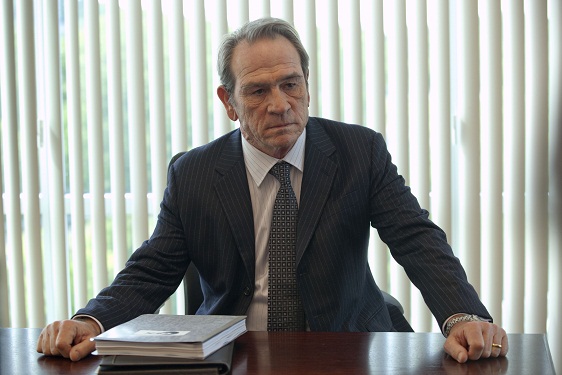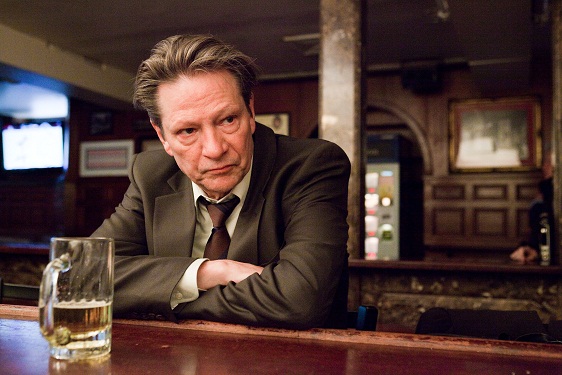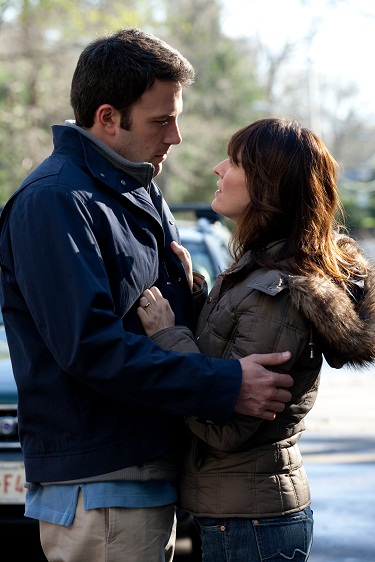
John Wells has a dream job. For 15 seasons as a writer and producer, he masterminded the hit television drama ER and also been a guiding force behind The West Wing, Third Watch, China Beach and the  current cable programs Southland and Shameless. He's won a long string of awards and currently serves as the president of the Writers Guild of America, West.
current cable programs Southland and Shameless. He's won a long string of awards and currently serves as the president of the Writers Guild of America, West.
At first it might seem ironic that his latest project, the new film The Company Men, deals with the traumas associated with unemployment. Nonetheless, he can make viewers empathize with three high powered shipping firm executives (Ben Affleck, Tommy Lee Jones, and Chris Cooper) who all lose their jobs the same way he could make the president of the United States seem human in The West Wing.
For a film that deals with misfortune, Wells has had a surprising amount of luck. His cast includes four Oscar-winners (Affleck, Jones, Cooper and Kevin Costner), and the film had a successful run at Sundance in 2010 and solid reviews this year. When he called me from Chicago two weeks ago, Wells sounded grateful for the reception for his feature directing debut, but he didn't seem to be taking anything for granted. I asked him if the cold weather in the Windy City had made him misty-eyed for his roots in Denver, and he replied, "I remember when misty-eyed was a good reason to have your eyes frozen to your head."
You actually started working on The Company Men years before you actually did any writing or shooting. Is that correct?
The initial impetus for it, not that it's really historic, was what happened to my brother in law. He, like a lot of other people during the dot com stuff, lost his job. He had an MBA and an electrical engineering degree. There was a day in which 5000 people in his company were let go through a merger. And he started telling me stories about what he was going through, and I got curious about it. There was a lot I didn't know about what people were going through, so I went on to some chat rooms. I posted little things saying, "Hey, I'm writing. If you're interested in telling me a little bit about it, please give me a call or write me a note."
I had 2,000 responses after the first weekend, so I realized I might actually be on to something (laughs). So I went from there to interviewing a lot of people on the phone, and I interviewed a lot of people in person. I came up with a rough draft, and about the time I finished it, the dot com recession was over. I thought it's not quite baked yet, and I put it aside. A few years later, the researcher that I worked with on the project called me in 2007 and said, you know, it's heating up again, so you might want to look at it again. I went back and did a lot of research and interviewed a whole other group of people and changed about 65 to 70 percent of the script.
As we were making the film, this very deep recession hit. When we made it, we sort of thought we were making a historical document. We thought that when we released it, people would think, thank God we're out of that, but we found ourselves in something that nobody really has anticipated over the last 50 years.
Didn't you interview an additional 300 people?
What happened is I interviewed a lot of people on e-mail, and I ended up doing a whole other group that I followed up with and on the phone. I also interviewed a lot of executives and people who were still in companies, not just people who had lost their jobs and had them talk about what they were going through. There's an awful lot of the film that's actually anecdotes and the stories that people told me about what had really happened to them.
I noticed that you do try to make Craig T. Nelson's character, the fictional company's CEO, less of an ogre.
There's a point of view for that character. I had a lot of CEOs call me back. I was kind of surprised. People, in fact, were interested in telling me their side of the story. He's saying, "Look, we have these other responsibilities. We have a responsibility to the shareholders, and those shareholders are all the people who have invested in the company. And that's what keeps this company afloat. And that's as far as our responsibilities to our workers go."
And other people who were like Gene, Tommy Lee Jones' character, had the attitude, "That's all true, but at the same time we have some kind of responsibility to the people we've worked with and who've given us their labor over all these years." And that's an ongoing debate in corporate America. There's not a simple answer to it.

Tommy Lee Jones in The Company Men, courtesy of The Weinstein Company.
One thing that haunted me was that there's no way a person with a family, like the Chris Cooper character, could do what some of these employers are expecting.
To use this new term that is a cliché already, which is "the New Normal," there's a very different way that we're all going to be looking towards our work and what we can do. I don't think we've fully faced up to the fact that this isn't something that affects just a few people. It's affecting most everyone. It's making a huge difference in which I think families are going to look at their finances. We've got this great dichotomy where in this service economy we have a lot more people who are buying things. It's going to be tough for us to come out of the recession in any kind of standard fashion. And yet at the same time we're telling people they need to save more and spend less.
That is a striking contradiction, but at the same time people like the Chris Cooper character don't have the skill set to look for new jobs.
The one real tragedy in all of this, I don't want to minimize any family's financial difficulties, things they're going through. For older workers, and that's anybody about over about 45 years of age, there are a lot of people that are basically getting thrown out of the workforce.
If you want to include the underemployed numbers, the number of people who actually have taken second jobs so they're not officially unemployed now, but who are making 60 percent less than they were making before who are just trying to qualify for Social Security and to get a little bit of money coming in, it's closer to 22 percent according to the commerce department. So there's this huge readjustment that's happening in the economy.

Chris Cooper in The Company Men, courtesy of The Weinstein Company.
In the film you show the Ben Affleck character getting upset because he'll have to either give up his luxury car or maybe his country club membership, but my father used to work sales as he did, and a good car is important to the trade. You can't sell real estate like my dad did in a stripped down Yugo.
He's not wrong, even though you feel more sympathy for his wife. He's not a wrong when he says I have to look successful. That is part of what he's selling.
Was it tricky to make the characters involving when the situations they are dealing with might be less severe that some of the concerns that some viewers might be dealing with?
I knew going in that I wanted to dramatize characters who would probably be unsympathetic in that you initially you sort of felt, "Why should I care about those guys?" And then show the human qualities of the things that they're going through, which actually do become universal. I think that by 2/3 of the way through the film, you can feel tremendous sympathy for this guy that at the beginning you're kind of wishing for his comeuppance.
There's this wonderful German word that I never pronounce correctly called schadenfreude, where we actually sit around and enjoy the demise of others, particularly others who kind of go through life with this kind of sense of entitlement. And yet the picture is trying to say, that guy, those people are also deserving of our sympathies because they are going through what so many other people are going through.
Even though you have a résumé that many people would envy, the entertainment business isn't for people who like stability.
No, I'm still a freelancer and have been for a long time. I was a carpenter when I was first hired to be a writer, which is why I did the carpentry work (in the film). There's a lot of similarities to it. You'd finish a job, and you didn't know where your next job was.
Since you mentioned that, how did Ben Affleck and Kevin Costner do imitating what you had once done?
Ben (who plays a white collar worker), fittingly, was terrible. But Kevin had done quite a bit of carpentry work, but both of us did our carpentry work before all those pneumatic tools were in use. We were both staring at a lot of the pneumatic hammers and thinking, "How do you do it?" I think he had some lessons. Kevin had done a lot of manual labor, and I had as well. We both kind of put on those little tool belts and felt pretty comfortable with it. Ben, fittingly, didn't know what he was doing.
Having been president of the Writers Guild of America, West (a job you still hold), do you think your background as a labor activist has influenced the content of this film?
I come from labor country. My mom was a teacher and was very involved in the teachers' union. I'm a big believer in the value of labor unions and with what collective effort gets people. I think we all are kind of colored by whatever we were raised with or what we came up believing in.
You also explore the costs of unemployment on these guys' marriages. One character is on the verge of getting a divorce, and another's marriage goes down the toilet.
These kind of difficult economic times put a lot of strain on marriages. One of the things that I discovered in doing the research, and I talked to lots and lots of different people about it, in talking to wives and husbands of people who lost their jobs is that people are so attached to their jobs that their sense of their worth is attached to their job that when they lose it they become a little unmoored. Who am I and what am I worth? That's a real shock to the spouse who doesn't really perceive them only through their work. But there are some who do, which is what I trying to show with Tommy Lee Jones' marriage.
It's a common theme. Losing your job can oftentimes cause marriages stress, but I also more often heard the story of how it was really hard, we almost killed each other, and yet our marriage is much stronger  now on the other side of it. And that was common with people I talked about it, no matter how difficult the circumstances were, how tough it was, how much they wouldn't want to repeat the experience, that they actually felt in some way strengthened by it and better for it. They wouldn't want to repeat it, but that it showed them a lot about their family and their friends and the people that rallied around them.
now on the other side of it. And that was common with people I talked about it, no matter how difficult the circumstances were, how tough it was, how much they wouldn't want to repeat the experience, that they actually felt in some way strengthened by it and better for it. They wouldn't want to repeat it, but that it showed them a lot about their family and their friends and the people that rallied around them.
You've written a lot for television, but was it tricky to write something that self contained? With The Company Men, you can't do a follow-up episode with some of the characters.
That's actually kind of how we determined it (laughs). I've worked on a lot of smaller films, and we really look at each story and say is this story better told by being able to tell it over a long period of time like the growth of someone as a physician in ER or the whole span of an administration in The West Wing? Or is it better told and what the maternal is a story about people going through a very particular series of events which is best dramatized in a short format. For this one, it was always clear that it was not a series. It was always going to be better as a film.
The scenes in the unemployment center were actually pretty funny because of all the happy talk the counselors were using. Were you surprised by the sort of things these counselors would say?
Oh, yeah (laughs), "The Tiger" and all that. I just wrote it down. I couldn't have made that up if I wanted to. I witnessed it. I also got to witness her (the counselor) marking up people's résumés as she does to Chris Cooper.
I talked to her about it afterwards and asked her, "Was it slightly ridiculous doing this?" And she said, "Absolutely. Yeah, yeah, they know it's a little ridiculous. I know it's a little ridiculous. But we're talking about people who've just been in a major automobile accident, and I'm the physical therapist who comes into the room when they've just come out of surgery and gets them out of the bed and makes them walk around because most people's reactions to these things when they happen is just a desire to crawl into bed and never come out."
I noticed her trying to do a lot of tough love with the Chris Cooper character.
It's toughest for workers in that age group. There's no question about it. Those are the people who are really, really struggling.
How did you decide on Boston for a setting, instead of say, Pittsburgh, where you went to college?
It was originally set in Pittsburgh and around the steel industry, and I hadn't been back in a few years. The last time I had been there, most of the mills had been shut down, but they were still there. We were looking for a physical representation to be able to shoot and see this place.
When I went back, they were all gone. They'd all been torn down and bought up by the companies that had put them out of business. The Chinese, the South Korean and the Brazilian steel companies came in and bought the mills and put them up for scrap and sold us some of the raw steel back. And so I didn't have any place to do it. And so I started asking other people, some of the financial people I'd been getting information from, what else might work as heavy manufacturing that was going to be under a lot of stress.
They said, "Well, automobiles." I said, "That's ridiculous. Nobody's going to believe that GM and Ford were going under." What did I know?
One thing they mentioned was non-military ship fabrication and manufacturing in this country. So we ended up in Boston because we were looking for a shipyard that we could shoot in and found the Four Rivers Shipyard down in Quincy, which had only been shut a couple of years and went down there and shot it.
Were you surprised that you managed to recruit a lot of A-list talent for The Company Men, like Oscar-nominated cinematographer Roger Deakins (No Country for Old Men, True Grit) as your director of photography?
I was surprised at every step of the way (laughs). I was very lucky with the cast. I made up a list of people I was interested in and started sending the script to them, and Ben was the first who responded and wanted to do it, and then Tommy Lee. Kevin called me and said he read the script and wanted to play Jack, which was a wonderful thing. I had kind of written it for him but never thought he would actually go with it.
And then we were sitting around trying to figure out who to have be the DP. I made up a list, and Roger was at the top of the list. I said we shouldn't even bother because he's not going to do it. They said you never know. So I sent it to him, and his agent called me and said, "What are you doing on Friday? Roger wants to get together." I don't ever anticipate this happening again in my career where everybody I wanted to do it actually did it (laughs).
But you are almost a "name" filmmaker because of ER and The West Wing. Do you think you might have had better luck than a newcomer who might have come up with a similar script?
You never know for sure because it's always conjecture. I don't think that people perceived when we sat down and talked about it that they were talking to a first-time director. They knew I'd done a lot of other things. I had a reputation for doing a certain kind of work. So I think all that was helpful. I wouldn't want to sound Pollyanna-ish about it, but I think I had an easier time about it because of that. That said, I was still amazed that I was actually able to put together who I was able to put together.
Is it tough to do quality television these days?
I think it's harder. I would separate that out and say that the advantage that we have now on television is that we have all these other wonderful outlets. We just started this new show on Showtime called Shameless that we could never have gotten done on network television. I have Southland, which was on network television, and they didn't want it, so we moved it to TNT. And they've been very supportive, which is great.
It is harder to get adult, character-driven material on television than it used to be, but there are lots of other places that you can go to sell it. If you can do it for basic cable or pay cable, we have those outlets.
That hasn't happened in the film business. These kinds of films are harder and harder to get made rather than easier. For most part it's a generalization, but the studios for the most part have gotten out of this part of business.
You've worked with some of the upper echelons of the TV business, but Warner Bros. or Paramount is not going to release this film.
I wrote it originally for Warner Bros., and they couldn't have been sweet enough about giving it back to me. They didn't want to make it.
No kidding? Was it tough to determine when to stop with this story because you're still getting new data on the subject?
I had to keep redoing it. In fact, we ended up putting on that opening montage (of financial news from 2008) for that reason to kind of set it in that time. When we did it, it didn't have that opening saying, "Hey, it's right here at this date and time" and people were confused because it's been in the news so much that people were saying they wouldn't have reacted this way because they would have known if it was two years later than when it actually takes place in the film. We definitely had to continually address that on a daily basis with the financial information. And finally once you've shot it, that became where it was, time-wise. We went back and did quite a bit of bits and pieces of dialogue changes. I think it worked.
Have you been able to stay in touch with the people you consulted with while you were writing and making the film?
I haven't really, not on a daily basis, because I didn't want it to be any kind of thing like that. But we have invited a lot of people to come and see it.
How have they reacted?
One of the things that's been very gratifying about the film is that I was afraid the people this has happened to wouldn't want to see the film, and it's been quite the opposite. When we screened it for people, they said, "That's me. That's my life. It's great to see it. It makes me not feel so alone." There's a quality to the film, like you're going through this all alone. People respond by feeling, "You really caught what I've gone through emotionally, and I want people around me to see this and understand that that's just what I'm going through." And that's the reaction from the people who had been through it and told me their stories.
All photos, © The Weinstein Company.
